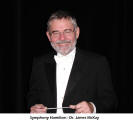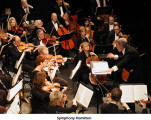
Symphony Hamilton
Anton Bruckner – a Genius "for later times".
In his score to Anton Bruckner’s Te Deum, Gustav Mahler crossed out the words "for chorus, soloists, orchestra and organ ad lib." and wrote in "for the tongues of angels, God-seekers, tormented hearts and souls purified in the fire." Anton Bruckner in his lifetime was never really a creature of his time. When he moved to Vienna, the celibate country organist whose rural accent was not sophisticated enough for elegant society was thrown into the musical controversies of the day. These now silly conflicts between the followers of Brahms and Bruckner’s beloved Wagner made him many enemies. This was perhaps accentuated by Bruckner himself who would defer to those he felt were his superiors. When you look at him more closely you see a genius who was closer perhaps to the mediaeval world of monasteries and the Catholic church music than the music dramas of Wagner or the post Beethoven symphonies of Brahms. His first major position was as organist at St Florian’s Monastery. Bruckner’s choral works have counterpoint that is closer to Pachebel, Schütz and Buxtehude and Gregorian Chants than it is to the leitmotiv of Richard Wagner. Whereas Mahler was the prophet of insecurity, "Angst" and the horrors of the modern age, Bruckner sings of consolation and spiritual ecstasy (Verzückung). One can picture the rural beauty of Austria and perhaps the spiritual core of the people here rather than the elegance of a ballroom in a palace. Magnificent brass, elegiac strings and sweet sounding woodwinds expressing feelings of eternity rather than modernity. Patience and penitence rather than individual posturing.
In our time Bruckner is still a "victim" of misconceptions.
His works are perceived as being "too long" yet most are the similar in
length to other 19th century orchestral compositions. Bruckner’s
6th Symphony is about 4 minutes longer than Schubert’s 9th,
7 minutes longer than Brahms’s Symphony No 1 and shorter than Beethoven’s
9th. He is also thought to be too loud yet in its orchestration the 6th
Symphony adds only a tuba to the orchestra used by Beethoven. His admirers
did him no favours early on when they preyed upon his insecurities and
naiveté and had him change and make cuts to early works. Bruckner himself
however made sure his original scores were in the national library where he
added the note "for later times". Symphony No 6 is a work that has had no
revisions by Bruckner’s "friends" and he himself called it his boldest work.
Approached without preconceptions Bruckner’s music will reach the innermost
recesses of the human soul. His music is certainly the most unique and
individualistic of the major symphonists of the 19th century. It
is unfortunate but while most orchestras may take a chance with a
performance of Bruckner’s 4th and 7th Symphonies other
works are not programmed out of fear for attendance. This is beginning to
change as Symphony Hamilton prepares a performance of the Symphony no.6 in A
major. This is a work that is quite simply one of the greatest treasures of
western music. This is the only performance that I am aware of in this area
for the last 30 years if indeed it has ever been performed in Ontario.
Bruckner’s "later times" are right now for Symphony Hamilton.
Symphony Hamilton
For the past 32 years, Symphony Hamilton has not only been entertaining audiences with large scale orchestral pieces, but has also been involved in the community (which includes Hamilton, Burlington Brantford, St. Catharines, Guelph and Kitchener-Waterloo.) Symphony Hamilton also helps bring music such as that of Anton Bruckner that is not performed regularly to the attention of the public. In fact the very first performance by this orchestra in 1973 was Bruckner’s 4th Symphony "The Romantic". Special care is taken in use the German and Austrian made rotary "Konzert" trumpets to give the authentic brass sound for Germanic works such as Beethoven, Bruckner and Brahms rather than the piston or "jazz" trumpets normally used in North American Orchestras. In our rehearsals, we provide an opportunity for new Canadians to meet fellow musicians and practice language skills in a familiar and supportive setting. Our principal clarinettist, Zoltan Kalman, who was principal clarinet of the Hungarian State Opera joined Symphony Hamilton shortly after coming to Canada. Agnes Frebold-Schroder emigrated from Austria and has played cello with Symphony Hamilton for its entire 32 years. Symphony Hamilton offers performance opportunities to students, qualified musicians seeking musical growth and to professional freelance musicians. We make symphonic music accessible by offering attractive concert programs at affordable prices and perform 10 concerts per season in Burlington and Hamilton.
 As
Symphony Hamilton's performance of Bruckner approaches in May, the intensity
mounts at rehearsals among the players and our conductor, James McKay.
Concentration and perfection increase as excellence is the goal. On
Friday, March 29 at 8:00 p.m., Symphony Hamilton will perform Anton
Bruckner’s Symphony no 6 in A major at St. Christopher's Anglican
Church, 662 Guelph Line, Burlington. The same program will be repeated
Sunday afternoon, at 3:00 p.m. at the Studio Theatre in Hamilton Place.
This performance includes Alberto Ginastera’s Variaciones Concertantes
that features the soloists within the orchestra.
As
Symphony Hamilton's performance of Bruckner approaches in May, the intensity
mounts at rehearsals among the players and our conductor, James McKay.
Concentration and perfection increase as excellence is the goal. On
Friday, March 29 at 8:00 p.m., Symphony Hamilton will perform Anton
Bruckner’s Symphony no 6 in A major at St. Christopher's Anglican
Church, 662 Guelph Line, Burlington. The same program will be repeated
Sunday afternoon, at 3:00 p.m. at the Studio Theatre in Hamilton Place.
This performance includes Alberto Ginastera’s Variaciones Concertantes
that features the soloists within the orchestra.
Tickets
:$22 Regular, $17 Senior/Student and $5 (child under 12 yrs.)
Hamilton concerts:
(905) 527-7666 or www.ticketmaster.ca
Burlington concerts: (
905) 634-1809 or www.mysymphony.ca
To learn more about Symphony Hamilton, please take a look at our web site at www.mysymhony.ca



